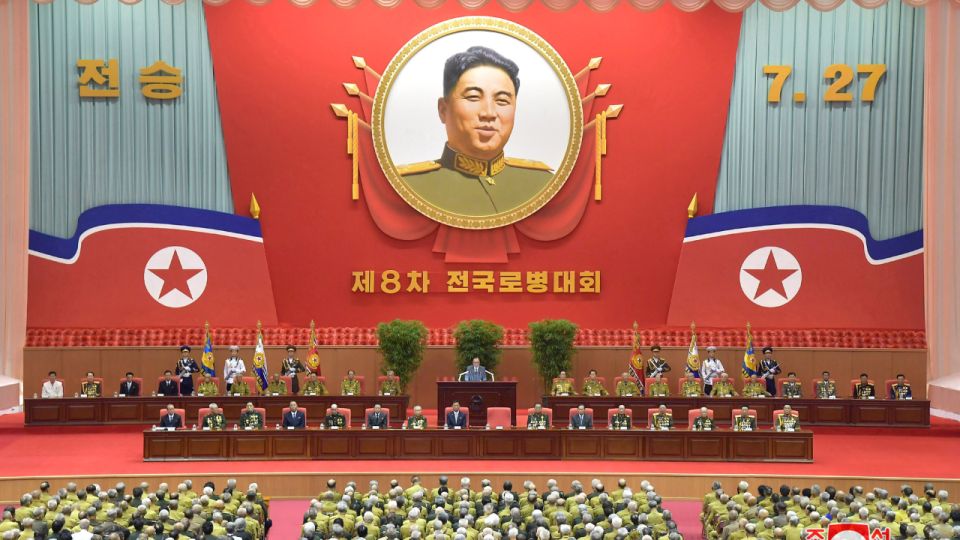July 28, 2022
SEOUL – North Korea held a politically charged event to mark its “Victory Day” in the Korean War, though its celebrations were notably absent of saber rattling and bellicose rhetoric from the country’s leader.
But the United States said concerns still remain over a seventh nuclear test, warning that it would incur “tremendous costs” to North Korea.
North Korea held an eighth national conference of war veterans in the capital city of Pyongyang on Tuesday on the occasion of the 69th anniversary of the 1953 armistice agreement that ended the 1950-53 Korean War. the Rodong Sinmun, a party organ, reported Wednesday.
Pyongyang has celebrated the July 27 anniversary as the “Day of Victory in the Great Fatherland Liberation War.” The gathering of war veterans was held under the Kim Jong-un regime as the key event to mark the national holiday. A total of eight events took place between 1993 and this year to celebrate the country’s claim of triumph against the US in the Korean War.
But North Korean leader Kim Jong-un did not attend this year’s event even though he was widely expected to send external messages to the US at a juncture when North Korea has reportedly completed its preparation for a seventh nuclear test.
Kim previously participated and delivered speeches in 2015, 2020 and 2021 to consolidate internal unity and step up anti-American indoctrination.
Instead, Jo Yong-won, a member of the Presidium of the Political Bureau of the ruling Workers’ Party of Korea, conveyed the congratulatory letter by the Central Party Committee.
The letter praised the sacrifice of Korean War veterans and called for the country to inherit the spirit of the war generation.
“The war in this land is not over yet,” the letter read. “The path of revolution we have decided to step forward and we must continue for generations accompanies a sharp confrontation with imperialism.”
But the letter did not carry any messages directly targeting the US and South Korea, or express intent to push for military and nuclear buildup.
“As this year did not mark a fifth or 10th anniversary and there was no need to make a shift in foreign policy and highlight external messages, Kim was absent and conveyed a congratulatory letter from the Central Committee,” said Yang Moo-jin, a professor at the University of North Korean Studies in Seoul, explaining that the annual event mainly targets an internal audience.
“Therefore, North Korea did not make any mention of nuclear weapons and any criticism of the US although it made reference to the US imperialist and imperialism.”
Yang also pointed out that the Kim Jong-un regime seeks to “play up its determination to succeed the heroic and revolutionary spirit of the war generation by holding the conference of war veterans for three years in a row.” Pyongyang also aims to utilize the events as means to promote internal unity and emphasize the necessity to surmount current challenges.
The Rodong Sinmun also called for the country to “vigorously struggle to open up a new era of a thriving powerful nation by cherishing the tradition of victory as a treasured sword” in a Korean-language editorial published Wednesday.
As part of its efforts, the newspaper emphasized that the country must “push forward the project to strengthen its self-defensive capabilities uninterruptedly and aggressively.”
“We should build up great power to firmly protect the safety and peace of our country by implementing the grand defense development strategy proposed at the eighth party congress to achieve great strides in the defense industry,” the Rodong Sinmun read.
North Korea celebrated its “Victory Day” without demonstrations of force although there was rampant speculation that North Korea could conduct a nuclear test on the occasion of the Korean War Armistice Day.
But the US State Department on Tuesday said that the US and South Korea have still assessed that North Korea has “conducted all necessary preparations for a potential nuclear test,” warning of the consequences of carrying one out.
“Our concerns regarding the potential for a seventh North Korean nuclear test have not abated,” State Department spokesperson Ned Price told a press briefing when asked if its assessment of a nuclear test remains valid.
“We have continued to be very clear in our public statements, but also working closely with our allies and partners in the Indo-Pacific and well beyond, to make clear that any additional nuclear test that the DPRK conducts would carry tremendous costs.”
National Security Council spokesperson John Kirby said the US will keep close tabs on any possibility of a seventh nuclear test, but he declined to predict a date and goal of the nuclear test.
“These tests have in the past — and if they test in the future — will in the future just add to the insecurity and instability on the Korean Peninsula,” Kirby said during a virtual press briefing. “Again, we would react appropriately along with allies and partners.”


